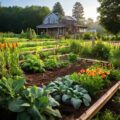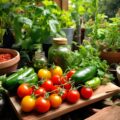Welcome the Renewal of Spring in Your Garden
As the days grow longer and warmer, there’s a palpable sense of renewal in the air. Spring is nature’s way of hitting the reset button, offering us a fresh start and the opportunity to nurture new life. For gardeners, this season is particularly magical—a time when we can reconnect with the earth and cultivate beauty and sustenance with our own hands. Let’s embrace this season of growth with a compassionate Spring Gardening Checklist that nurtures both our gardens and our well-being.
Preparing Your Garden with Care and Intention
Before we dive into planting, it’s essential to prepare our garden spaces with mindfulness and care. This isn’t just about clearing debris; it’s about creating a welcoming environment for new life to thrive:
- Gently clear away winter remnants, taking care not to disturb any beneficial insects that may still be sheltering.
- Examine your soil with curiosity and appreciation. Is it compacted from winter rains? Loosen it gently with a fork, imagining the roots that will soon make their home there.
- Add compost or well-rotted manure to nourish your soil. Think of this as providing a warm, nutritious welcome for your future plants.
- Clean and sharpen your tools, treating them as valued partners in your gardening journey.
Planting with Purpose and Joy
Now comes the heart of spring gardening—planting! This is a time to connect with the cycle of life and find joy in the promise of growth:
- Choose plants that resonate with you, whether for their beauty, their scent, or their ability to support local wildlife.
- Consider companion planting to create harmonious plant communities that support each other’s growth.
- As you plant each seed or seedling, take a moment to set an intention for its growth and the joy it will bring.
- Don’t forget to include some edibles—there’s something deeply satisfying about growing your own food.
Remember, gardening isn’t about perfection. It’s about learning, growing, and finding peace in the process.
Nurturing Your Garden and Yourself
As your garden begins to flourish, so too can your sense of well-being. Tending to your plants can be a form of meditation, a way to practice mindfulness and cultivate inner peace:
- Water your plants mindfully, observing how the water brings life and vitality.
- Take time to observe your garden daily, noticing small changes and celebrating growth.
- Practice gratitude for the miracle of life unfolding before you.
- Allow yourself to find joy in the simple acts of weeding, pruning, and tending.
Remember, your garden is not just a reflection of your care for plants, but also a reflection of your care for yourself and the world around you.
Creating a Haven for Wildlife
A truly vibrant garden is one that welcomes and supports a diverse ecosystem. By creating a space that’s hospitable to wildlife, we contribute to the health of our local environment and create opportunities for wonder and connection:
- Plant native flowers to support local pollinators.
- Create a small water source for birds and beneficial insects.
- Leave some areas of your garden a little wild to provide shelter for various creatures.
- Avoid using chemical pesticides, opting instead for natural pest control methods that maintain the balance of your garden ecosystem.
As you welcome wildlife into your garden, take time to observe and appreciate the intricate web of life that you’re supporting.
Embracing the Lessons of the Garden
Perhaps the most beautiful aspect of gardening is how it teaches us valuable life lessons. As you work through your spring gardening checklist, reflect on these parallels:
- Patience: Not everything blooms at once. Just as in life, good things take time to grow and develop.
- Resilience: Plants often bounce back from setbacks, reminding us of our own capacity for resilience.
- Interconnectedness: A healthy garden is an ecosystem where everything is connected, much like our communities and the world at large.
- Impermanence: The changing seasons remind us to appreciate the present moment and find beauty in life’s cycles.
By approaching our spring gardening with mindfulness and compassion, we not only create beautiful outdoor spaces but also cultivate inner peace and connection with the natural world.
FAQ: Nurturing Your Spring Garden
Q1: How often should I water my spring garden?
A1: Watering needs vary depending on your climate, soil type, and plant varieties. Generally, it’s best to water deeply but less frequently to encourage strong root growth. Always check the soil moisture before watering and aim to water in the morning to reduce evaporation.
Q2: What are some easy vegetables to grow for beginners?
A2: Some beginner-friendly vegetables include lettuce, radishes, snap peas, cherry tomatoes, and zucchini. These plants are relatively low-maintenance and can provide a rewarding harvest for new gardeners.
Q3: How can I attract more pollinators to my garden?
A3: Plant a variety of native flowers that bloom at different times throughout the season. Some pollinator favorites include lavender, coneflowers, bee balm, and sunflowers. Also, provide a shallow water source and avoid using pesticides.
Q4: What’s the best way to deal with garden pests naturally?
A4: Start by promoting a healthy ecosystem that includes beneficial insects. Use companion planting techniques, like planting marigolds to repel pests. For specific issues, try natural solutions like neem oil or insecticidal soap. Remember, a few pests are normal and don’t always require intervention.
Q5: How can I make gardening more accessible if I have physical limitations?
A5: Consider raised beds or container gardening to reduce the need for bending. Use ergonomic, lightweight tools with extended handles. Create paths wide enough for mobility aids if needed. Remember, gardening is for everyone, and there are always ways to adapt the practice to suit your needs.
As you embark on your spring gardening journey, remember that the true joy lies not just in the end result, but in the process itself. Each moment spent in your garden is an opportunity to connect with nature, find peace, and cultivate not just plants, but also your own well-being. Happy gardening!









